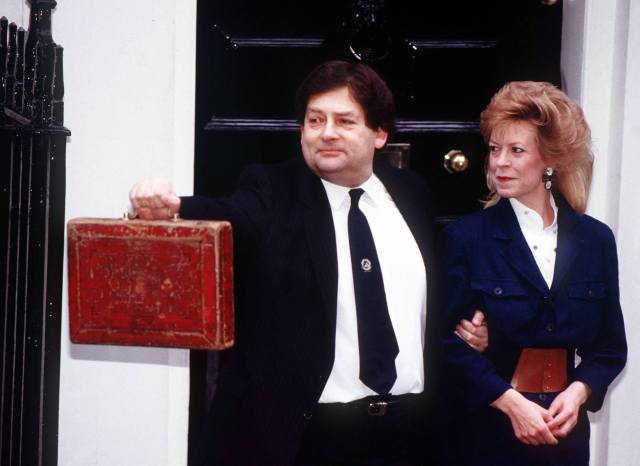As Chancellor of the Exchequer, Nigel Lawson used his 1988 Budget to tax capital gains at the same rate as income tax. Credit: Martin Keene/PA Archive/PA Images
The first article in our wealth tax mini-series argues that now, more than ever, we need to return to the system whereby all income is taxed the same. Not only because the current system is unfair, but because the future health of our economy depends on it
Most of us work for a living. We aren’t trustafarians, with a nice monthly dividend check from a safely-invested inheritance we didn’t earn. Nor are we corporate titans, with millions in stock options salted away after a stellar business career. Those kinds of people are pretty rare.
So how can it be fair to tax income from work at a higher rate than income from wealth? At the moment, we tax workers at 20%, 40% or 45%, but dividends at 7.5%, 32.5% and 38.1% and capital gains at 10% and 20% (18% and 28% on property excluding first homes).
The only people who benefit from these lower rates are the ones who are already rich. A tiny minority of wealthy people who don’t have to work for a living are getting a much better deal than everybody else who does. So, too, are those on the highest incomes: people earning over £1 million receive a fifth of their incomes in dividends, interest and property income, relative to less than 5% for those earning between £20,000 and £30,000. The ‘haves’ are being subsidised by the ‘have-nots’. No wonder so many people feel the system is unfairly stacked against them.
That’s why we support a simple proposal: tax all income the same, whether it comes from work or from wealth. Equalising the rates would make our tax system dramatically simpler and fairer at a stroke, because self-employed people and corporate bosses wouldn’t be able to avoid higher income tax rates by getting paid in capital gains or dividends instead.
It’s not a new idea; our tax system used to tax all income equally from 1988 to 1998, when Nigel Lawson was Chancellor. It wasn’t just a question of fairness; it made our economy work better too. Lawson argued that taxing different types of income at different rates was nothing more than political favouritism; a taxpayer-funded subsidy for whichever side has the best Westminster lobbyists. Equal treatment allows investment and jobs to flow to wherever they can be deployed most productively, without distortions, making British firms more competitive and efficient on the international stage.
And, in a fast-changing world, investing to win in new industries will be essential. The fourth industrial revolution means British businesses will probably be unrecognisable in 20 years from now. People will be doing jobs we’ve never heard of, and existing roles, in everything from law to medicine or teaching, will be done by fewer staff with help from super-smart robotics.

That’s a godsend for countries with ageing workforces, such as Britain, because it means our economies can become ever-more-productive and efficient with fewer workers. But it also means we mustn’t become too dependent on taxing income from work instead of wealth. The system should be future-proof, which treating income from work and wealth the same would make it.
And, socially, we need to make sure it isn’t just the top 10% of share owners or those trustafarians who benefit from all those investments in the new economy. A universal, pooled investment fund – a UK Sovereign Wealth Fund – would mean everybody would get some income from wealth as well as work. It would knit Britain’s divided society back together by creating concrete proof that the system isn’t stacked against the ‘have nots’. And it would be the perfect complement to our new, simpler, fairer and more economically-efficient tax system.










Join the discussion
Join like minded readers that support our journalism by becoming a paid subscriber
To join the discussion in the comments, become a paid subscriber.
Join like minded readers that support our journalism, read unlimited articles and enjoy other subscriber-only benefits.
Subscribe